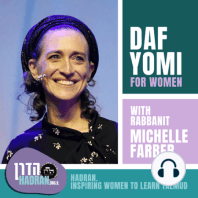43 min listen
Nedarim 2 - October 27, 2 Cheshvan
ratings:
Length:
44 minutes
Released:
Oct 27, 2022
Format:
Podcast episode
Description
Study Guide Nedarim 2 Masechet Nedarim is sponsored by Aviva and Benny Adler in honor of our mother Lorraine Kahane and in loving memory of our parents Joseph Kahane z"l, Miriam and Ari Adler z"l. Today's daf is sponsored by the Agus family in honor of Aviva Adler completing the Siyum HaShas. Today's daf is sponsored by Rabia and Oliver Mitchell in honor of their daughter Ellin Mitchell Cooper on becoming the Yoetzet Halacha for Manhattan. Today's daf is sponsored by Amy Bardack in loving memory of the 11 souls who were killed in the Pittsburgh synagogue shooting four years ago. Yehi Zichram Baruch. When someone takes a vow to forbid an item, that vow is effective. One can take a vow using the language of a vow (neder) or also using a similar term that has the same meaning (kinui). The same holds true for cherem (a type of vow performed by using the term cherem), oaths and vows to take upon oneself to become a nazir. If one uses a different language that indicates that one is distancing or separating from a friend or one will not eat from a friend, this is effective as well. The Gemara refers to this category as yadot, incomplete statements. If one uses a language of excommunication: "I am menuda (excommunicated) from you," Rabbi Akiva was unsure how to treat it and therefore ruled stringently. Masechet Nazir begins in the same manner, mentioning that if one uses a kinui (word similar to) of nazir, the vow is effective, but does not mention vow, oaths and cherem. The Gemara notes the difference between the two mishnayot and tries to figure out why. The answer leads to a further question regarding the order of our Mishna - vows, cherem, oaths and nazir. Another issue is raised regarding the structure of the Mishna. To resolve this issue, they explain that the Mishna is missing words. This leads to a further question as the order is troubling - it starts with kinuyim and then moves to yadot, then explains the yadot in detail and then goes back to explain kinuyim. Why? This can be explained as an ABBA structure as can be found in a number of other mishnayot. Why are some mishnayot written in that structure and others ABAB?
Released:
Oct 27, 2022
Format:
Podcast episode
Titles in the series (100)
Berakhot 17: The gemara lists prayers that rabbis would add at the end of their shmone esreh or at particular moments. What is the root of the debate between the rabbis and Rabban Shimon ben Gamliel regarding whether or not a groom can say shema on his wedding... by Daf Yomi for Women - Hadran
